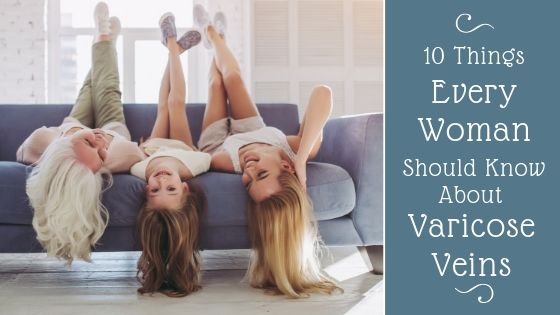I know it doesn’t seem fair, but it’s true. Women are more likely to develop varicose veins than men. It doesn’t mean that men cannot develop them, there are just specific biological reasons that women are statistically more likely to have varicose veins. In fact, studies suggest women may actually be twice as likely to have varicose veins.
Because everyone is either a woman or knows one, we should all take this fact to heart and be aware of these important things about women and varicose veins.

Table of Contents
Toggle1. Hormones
Women experience hormonal changes before menstruation, during pregnancy, and in menopause that each can tend to relax vein walls. One appropriately named is relaxin which is produced during pregnancy. As vein walls relax, they can stretch and valves can become damaged or weakened causing blood to pool in the lower legs and ankles. Excessive estrogen or progesterone may also cause soft tissue to relax and cause vein valves to weaken, causing varicose veins.
2. Hormone-Based Birth Control & Hormonal Treatment for Menopause
Related to the previous factor, hormone-based birth control and treatment for menopause can cause some women to be at a greater risk for weakened blood valves, and therefore varicose veins.
3. Pregnancy
Some women experience varicose veins only during pregnancy. The increased blood flow to support the pregnancy puts more pressure on the mother’s veins, causing vein walls to weaken. For many women, this type of varicose vein goes away after pregnancy but for some women, the issue persists.

4. Family History
It’s important to know your family history, where possible. Your genetics can play a significant part in your propensity to develop varicose veins.
5. Places They Can Pop Up
Most varicose veins occur in the ankles, feet and legs but they can appear other places. One commonly known ailment that is actually a type varicose veins are hemorrhoids. Maybe less commonly known is that varicose veins can actually occur in the pelvis, lower abdomen, or buttocks.

6. Height Factor
Being taller definitely has its perks, as does being shorter. But if you are taller than average, you may be at a greater risk for varicose veins. In a study released in December, 2018, the American Heart Association reported finding that in addition to risk factors that were already known, “several novel predictors of varicose veins were identified, including leg bioimpedance, height, and history of surgery on leg arteries or other major operation.”
7. Lifestyle Impact
If your lifestyle is more sedentary or extremely active, you may be equally at greater risk for varicose veins. Likewise, if your job has you standing for long hours, you are at greater risk as well.
8. Cosmetic or Medical?
If you’re wondering if varicose veins are simply a cosmetic issue or a medical issue, the answer is yes. They can be both. Thankfully, both can be treated effectively. And know this, it is not vain to take care of your vein health. The best path forward is to get a consultation.
9. Hard to Conceal
It can be troublesome to try to conceal varicose and spider veins. And home remedies just aren’t very effective for healing or concealing. Save your time, money, and efforts and have them treated professionally. You’ll have better results and it will last longer.
10. Where There’s One, There’s Often More
Because of the circumstances that lead to the development of varicose veins, if you find one then you are likely to have more. But you don’t have to suffer in silence and live the rest of your life covering them up.

Treatment Options
Non-invasive options you can do to help treat varicose veins include compression therapy, staying hydrated, incorporating movement into your lifestyle, and more.
Medical treatment options for varicose veins include various minimally-invasive treatments that involve different methods to cause the non-functioning varicose veins to close or collapse so the blood cannot pool in them anymore.


Let’s Talk!
Come on in for a free consultation. Schedule yours today!
Want to learn more? Learn about our Cosmetic Procedures or find out the 5 Things to Know About Pregnancy & Vein Health. And if you’re feeling guilty about wanting to rid yourself of unsightly veins, you’ll want to read It’s Not Vain to Take Care of Your Veins.

